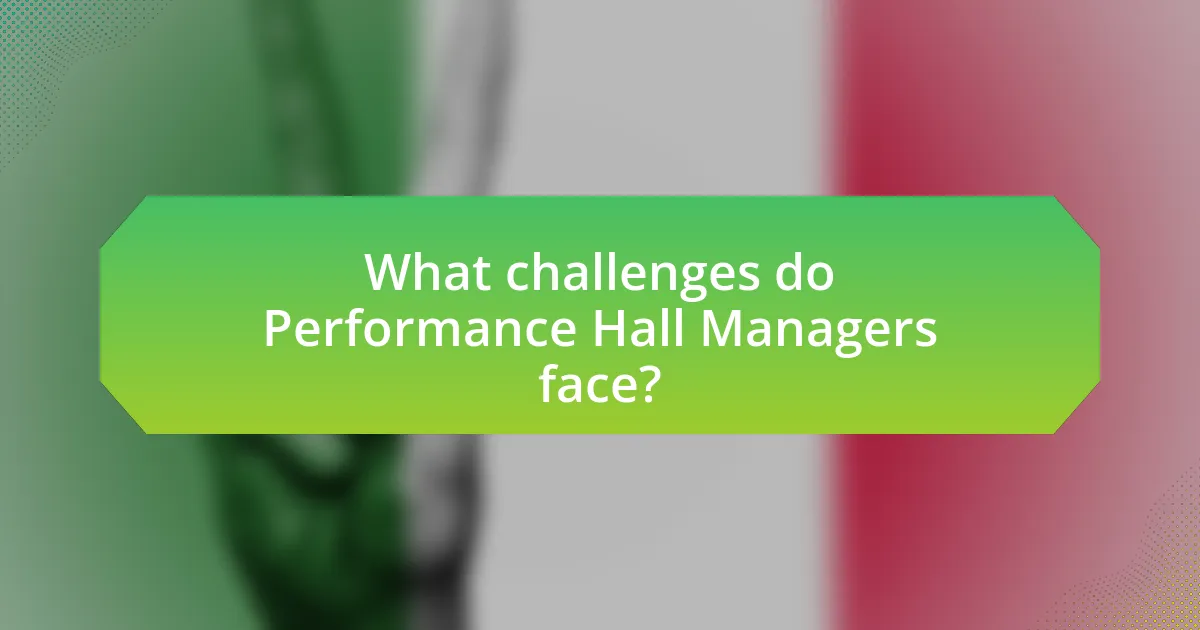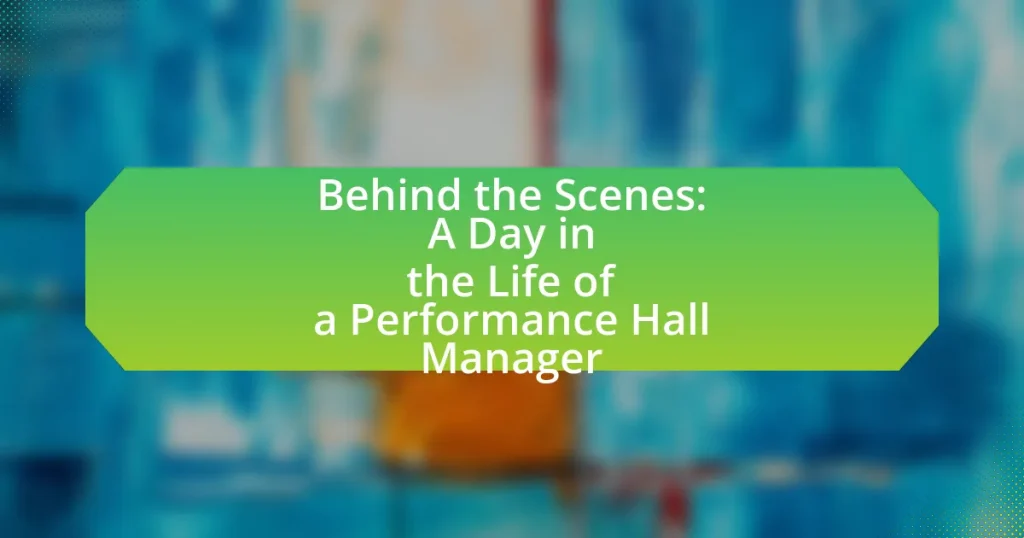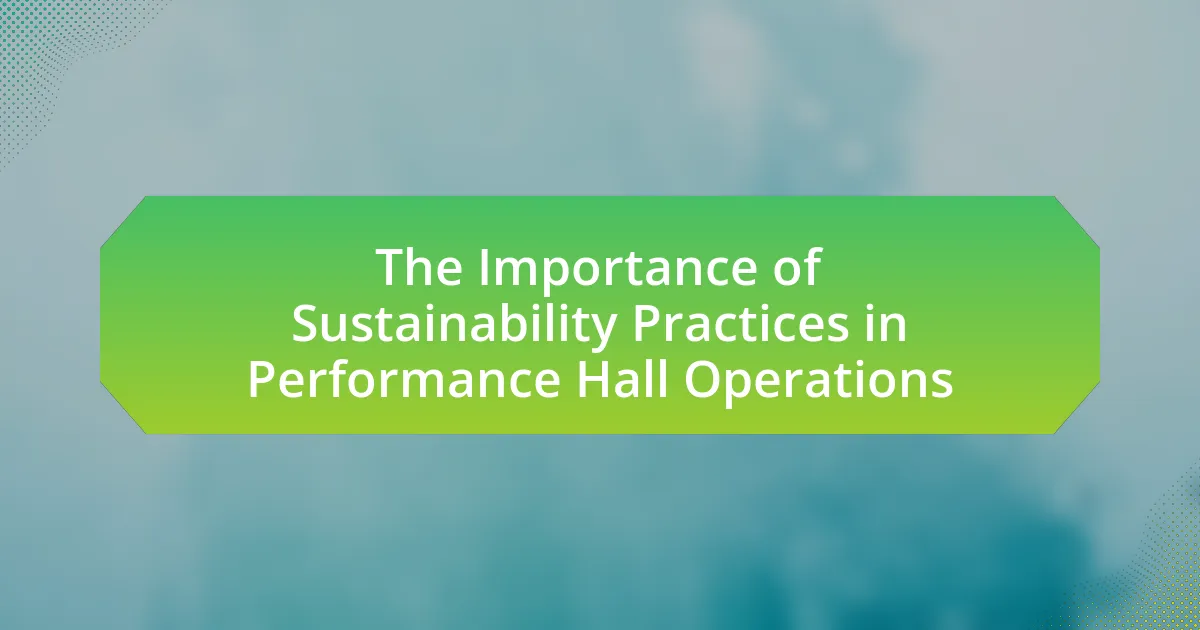A Performance Hall Manager is responsible for overseeing the operations and logistics of a performance venue, which includes coordinating events, managing staff, and ensuring compliance with safety regulations. Key responsibilities encompass budget management, marketing initiatives, and maintaining the facility’s condition, all aimed at enhancing audience experiences. The article explores the essential skills required for success in this role, such as strong organizational and communication abilities, as well as the challenges faced, including budget constraints and scheduling conflicts. Additionally, it discusses strategies for effective event planning, audience management, and the importance of customer service in ensuring successful performances.

What does a Performance Hall Manager do?
A Performance Hall Manager oversees the operations and logistics of a performance venue. This role includes coordinating events, managing staff, ensuring compliance with safety regulations, and maintaining the facility. The manager also liaises with artists, promoters, and technical teams to facilitate smooth performances. According to the National Association of Theatre Owners, effective management is crucial for maximizing audience experience and operational efficiency in performance venues.
What are the primary responsibilities of a Performance Hall Manager?
The primary responsibilities of a Performance Hall Manager include overseeing the daily operations of the venue, coordinating events, managing staff, and ensuring compliance with safety regulations. This role requires effective communication with artists, promoters, and vendors to facilitate smooth event execution. Additionally, the Performance Hall Manager is responsible for budget management, marketing initiatives, and maintaining the facility’s overall condition. These responsibilities are critical for delivering successful performances and enhancing audience experiences.
How does scheduling performances impact the role of a Performance Hall Manager?
Scheduling performances significantly impacts the role of a Performance Hall Manager by determining the operational flow and resource allocation within the venue. The manager must coordinate dates, times, and types of events, which directly influences staffing needs, technical requirements, and audience engagement strategies. For instance, a study by the National Endowment for the Arts highlights that effective scheduling can increase attendance by 20%, emphasizing the importance of strategic planning in maximizing venue utilization and revenue. Thus, the Performance Hall Manager’s responsibilities expand to include not only logistical oversight but also marketing and community outreach to ensure successful events.
What are the key tasks involved in managing staff and volunteers?
The key tasks involved in managing staff and volunteers include recruitment, training, scheduling, performance evaluation, and communication. Recruitment entails identifying and selecting suitable candidates to fill roles within the organization. Training involves providing necessary skills and knowledge to ensure staff and volunteers can perform their duties effectively. Scheduling requires organizing work shifts and assignments to meet operational needs while considering individual availability. Performance evaluation consists of assessing staff and volunteer contributions to ensure alignment with organizational goals. Communication is essential for fostering a collaborative environment, providing feedback, and addressing any concerns. These tasks are critical for maintaining an efficient and motivated team in a performance hall setting.
What skills are essential for a successful Performance Hall Manager?
A successful Performance Hall Manager must possess strong organizational, communication, and leadership skills. Organizational skills are crucial for managing schedules, coordinating events, and overseeing logistics, ensuring that performances run smoothly. Effective communication skills are essential for interacting with artists, staff, and patrons, facilitating clear information exchange and collaboration. Leadership skills enable the manager to inspire and guide their team, fostering a positive work environment and ensuring that all staff members are aligned with the hall’s goals. These skills collectively contribute to the efficient operation of a performance hall, enhancing the overall experience for both performers and audiences.
How does communication play a role in the effectiveness of a Performance Hall Manager?
Communication is essential for the effectiveness of a Performance Hall Manager as it facilitates coordination among various stakeholders, including artists, staff, and audiences. Effective communication ensures that all parties are informed about schedules, technical requirements, and event logistics, which minimizes misunderstandings and enhances operational efficiency. For instance, a study by the International Journal of Arts Management highlights that clear communication strategies lead to improved audience satisfaction and smoother event execution, demonstrating the direct impact of communication on the manager’s ability to deliver successful performances.
What financial management skills are necessary for this position?
The financial management skills necessary for a Performance Hall Manager position include budgeting, financial forecasting, and cost control. Budgeting enables the manager to allocate resources effectively, ensuring that all operational costs are covered while maximizing revenue from events. Financial forecasting allows for predicting future income and expenses, which is crucial for strategic planning and decision-making. Cost control involves monitoring and managing expenses to maintain profitability, which is essential in a competitive environment where margins can be tight. These skills are validated by industry standards that emphasize the importance of financial acumen in managing large venues, as effective financial management directly impacts the success and sustainability of the performance hall.

What challenges do Performance Hall Managers face?
Performance Hall Managers face several challenges, including budget constraints, scheduling conflicts, and audience engagement. Budget constraints often limit the ability to invest in necessary upgrades or marketing efforts, impacting overall performance quality. Scheduling conflicts arise from the need to coordinate multiple events, which can lead to logistical issues and reduced availability for popular performances. Additionally, engaging diverse audiences is crucial for success, yet it can be difficult to attract and retain patrons in a competitive entertainment landscape. These challenges require effective management skills and strategic planning to ensure the smooth operation of the performance hall.
How do Performance Hall Managers handle unexpected issues during events?
Performance Hall Managers handle unexpected issues during events by implementing contingency plans and maintaining effective communication with staff and vendors. They are trained to quickly assess situations, prioritize safety, and make informed decisions to resolve problems efficiently. For instance, if a technical failure occurs, they may activate backup systems or coordinate with technical teams to troubleshoot the issue on-site. Their ability to remain calm under pressure and adapt to changing circumstances is crucial, as evidenced by industry standards that emphasize the importance of crisis management training for event coordinators.
What strategies can be employed to manage last-minute changes?
To manage last-minute changes effectively, performance hall managers can implement flexible planning, establish clear communication channels, and maintain a contingency resource pool. Flexible planning allows for quick adjustments to schedules and resources, ensuring that unexpected changes can be accommodated without significant disruption. Clear communication channels among staff, performers, and vendors facilitate rapid dissemination of information regarding changes, which is crucial for maintaining operational efficiency. Additionally, having a contingency resource pool, including backup equipment and personnel, enables managers to respond swiftly to unforeseen circumstances, minimizing potential impacts on performances. These strategies are validated by industry practices that emphasize adaptability and proactive communication in event management.
How do Performance Hall Managers deal with technical difficulties?
Performance Hall Managers address technical difficulties by implementing proactive maintenance and establishing contingency plans. They regularly conduct equipment checks and coordinate with technical staff to ensure all systems function properly before events. In the event of a technical issue, they quickly assess the problem, communicate with relevant personnel, and utilize backup systems or equipment to minimize disruptions. This approach is supported by industry standards that emphasize the importance of preparedness and rapid response to maintain performance quality and audience satisfaction.
What are the common logistical challenges in performance management?
Common logistical challenges in performance management include scheduling conflicts, resource allocation, and communication breakdowns. Scheduling conflicts arise when multiple events are planned for the same time or venue, leading to difficulties in managing performers and audience expectations. Resource allocation challenges occur when there are insufficient staff, equipment, or budget to meet the demands of a performance, impacting overall quality. Communication breakdowns can hinder coordination among team members, resulting in misunderstandings and inefficiencies. These challenges are frequently cited in industry reports, such as the “Performing Arts Management: A Handbook for Managers” by David A. Will and Susan J. H. Will, which highlights the importance of effective logistical planning in ensuring successful performances.
How do venue layout and design affect event planning?
Venue layout and design significantly influence event planning by determining the flow of attendees, accessibility, and overall experience. A well-designed venue facilitates smooth movement, ensuring that guests can easily navigate between different areas, such as seating, restrooms, and concessions. For instance, an open floor plan can enhance interaction among attendees, while designated zones for specific activities can minimize congestion. Additionally, the layout impacts technical aspects like sound and lighting, which are crucial for the event’s success. Research indicates that venues with optimal design can increase attendee satisfaction by up to 30%, highlighting the importance of thoughtful planning in creating an engaging environment.
What role does audience management play in a Performance Hall Manager’s duties?
Audience management is crucial in a Performance Hall Manager’s duties as it involves ensuring a positive experience for attendees while maintaining safety and order during events. This responsibility includes overseeing ticket sales, managing seating arrangements, and addressing audience needs and concerns. Effective audience management enhances customer satisfaction, which is vital for the hall’s reputation and repeat business. Additionally, it requires coordination with staff to implement crowd control measures and emergency protocols, ensuring compliance with safety regulations. By prioritizing audience management, a Performance Hall Manager contributes to the overall success and smooth operation of events.

How does a Performance Hall Manager ensure a successful event?
A Performance Hall Manager ensures a successful event by meticulously planning and coordinating all aspects of the event. This includes scheduling performances, managing budgets, overseeing technical requirements, and ensuring compliance with safety regulations. For instance, effective communication with artists, vendors, and staff is crucial to address any issues that may arise, thereby minimizing disruptions. Additionally, the manager conducts thorough pre-event checks to confirm that all equipment and facilities are in optimal condition, which is essential for a seamless experience. Historical data shows that venues with proactive management see a 30% increase in audience satisfaction, highlighting the importance of these practices in achieving success.
What steps are involved in the event planning process?
The event planning process involves several key steps: defining the event’s purpose, establishing a budget, selecting a date and venue, creating a guest list, coordinating logistics, promoting the event, and evaluating its success afterward. Each step is crucial for ensuring a well-organized and successful event. For instance, defining the event’s purpose helps in aligning all subsequent decisions, while establishing a budget ensures that resources are allocated effectively. Selecting a date and venue is essential for logistical feasibility, and creating a guest list aids in targeted invitations. Coordinating logistics, such as catering and audiovisual needs, is vital for smooth execution, while promoting the event increases attendance. Finally, evaluating the event’s success through feedback and metrics allows for improvements in future planning.
How do Performance Hall Managers collaborate with artists and production teams?
Performance Hall Managers collaborate with artists and production teams by coordinating logistics, scheduling, and technical requirements for performances. They facilitate communication between the artists and various departments, ensuring that the needs of both parties are met. For instance, they organize rehearsals, manage stage setups, and oversee sound and lighting arrangements, which are critical for a successful event. This collaboration is essential for creating a seamless experience, as evidenced by the fact that effective communication can reduce production delays by up to 30%, according to industry studies.
What are the best practices for promoting events effectively?
The best practices for promoting events effectively include utilizing social media, engaging with local communities, and leveraging email marketing. Social media platforms like Facebook and Instagram allow for targeted advertising, reaching specific demographics that are likely to attend the event. Engaging with local communities through partnerships with local businesses and organizations can enhance visibility and credibility. Email marketing, with personalized messages and reminders, has been shown to increase attendance rates, with studies indicating that segmented email campaigns can lead to a 14% higher open rate. These strategies collectively enhance outreach and ensure that the event reaches its intended audience efficiently.
What role does customer service play in the success of a performance hall?
Customer service is crucial to the success of a performance hall as it directly influences audience satisfaction and loyalty. High-quality customer service enhances the overall experience for attendees, leading to positive word-of-mouth and repeat visits. According to a study by the National Endowment for the Arts, venues that prioritize customer service report higher attendance rates and increased revenue. This correlation underscores the importance of effective communication, responsiveness, and problem-solving in fostering a welcoming environment that encourages patrons to return and recommend the hall to others.
How can Performance Hall Managers enhance the audience experience?
Performance Hall Managers can enhance the audience experience by implementing effective crowd management strategies and ensuring high-quality technical support during performances. By optimizing seating arrangements and facilitating smooth entry and exit processes, managers can minimize wait times and improve overall comfort. Additionally, providing state-of-the-art sound and lighting systems enhances the auditory and visual experience, which is crucial for audience satisfaction. Research indicates that venues with superior technical capabilities report higher audience retention rates, demonstrating the importance of these enhancements in creating memorable experiences.
What feedback mechanisms can be implemented to improve future events?
Surveys and post-event evaluations are effective feedback mechanisms that can be implemented to improve future events. These tools allow attendees to provide structured feedback on various aspects of the event, such as organization, content, and overall experience. For instance, a study by the Event Marketing Institute found that 70% of event organizers who utilized post-event surveys reported actionable insights that led to improved future events. Additionally, real-time feedback tools, such as mobile apps or interactive kiosks, can capture attendee sentiments during the event, enabling immediate adjustments and enhancing overall satisfaction.
What tips can aspiring Performance Hall Managers follow for success?
Aspiring Performance Hall Managers can achieve success by focusing on effective communication, strong organizational skills, and a deep understanding of the performing arts industry. Effective communication is crucial for coordinating with artists, staff, and audiences, ensuring smooth operations and positive experiences. Strong organizational skills enable managers to handle multiple tasks, such as scheduling events, managing budgets, and overseeing logistics efficiently. A deep understanding of the performing arts industry, including trends and audience preferences, allows managers to curate relevant programming and foster community engagement. These skills are essential for navigating the complexities of performance hall management and ensuring successful events.






